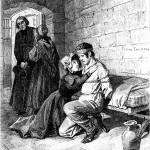Danae Davis: Growing Pearls Among Central City Teen Age Girls
Danae Davis was well along in a distinguished career in executive positions in government and corporations. But she was approaching 50, she felt she needed to do something that had more meaning for her, and she was distressed about the situations of so many young people in Milwaukee.
A friend, Colleen Fitzgerald (now an executive coach for Marquette University), was founder of a small organization that aimed to help central city teenage girls make good decisions about their lives. It was called Pearls for Teen Girls. Fitzgerald suggested to Davis that she become executive director. It paid a lot less than corporate work. But it was exactly the kind of thing Davis was looking for.
That was six years ago. Pearls has grown from serving about 500 girls a year to about 1,100. Davis says she is serious about growing it to 10,000 girls a year. And its track record is impressive – nearly 100% of participating girls who have reached the appropriate age have graduated high school on time and gone on to post-secondary education. Nearly 100% have avoided becoming pregnant.
Davis told Mike Gousha during an “On the Issues” session at Eckstein Hall on Nov. 15 that Pearls is built around small groups of girls ages 10 to 19 who meet weekly for sessions that mix fun with programs focusing on serious issues. The result is a support structure for girls to pursue constructive futures.

